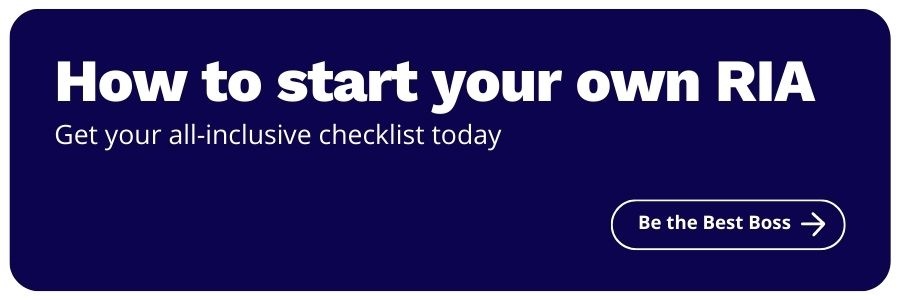11 Myths to Stop Believing about Fee-Only Financial Planners
Share this
The XY Planning Network has a few requirements for membership, and one of the leading qualifications is that you must be a fee-only financial planner. And as easy as it seems to determine if someone is fee-only, it’s actually a fairly complicated process.
At the Network, we adopted the CFP Board’s definition of “fee-only.” While we don’t necessarily agree with every facet of it -- as co-founder Michael Kitces wrote about in the past -- we didn’t want to create a second definition of fee-only and further muddy the waters on what the term really means.
Where Does Fee-Only Come From?
Ever wonder where the term came from in the first place? The CFP Board simply stated their version of what constituted fee-only, and the industry moved forward with what the Board stated.. There wasn’t a precise definition.
But NAPFA -- the National Association of Personal Financial Advisors and the home of fee-only advisors -- already had their own definition of what it meant to be a fee-only financial planner. When the CFP Board rolled out new rules a few years ago with a definition that was different from NAPFA’s, it created this two definition of fee-only issue.
When we launched the XY Planning Network, we chose to use the CFP Board’s definition for clarity with consumers as well as advisors. And today, whenever we talk to advisors interested in joining XYPN, we get a lot of questions around being fee-only.
Busting the Myths Around the Fee-Only Designation
There are a lot of myths surrounding the definition of fee-only financial planners, what constitutes fee-only, and what would violate the definition of fee-only. Unfortunately, we see many people in the industry trying to use that confusion to their advantage and to find a workaround to the qualifications of what makes an advisor fee-only.
The following is a list of 11 questions or statements we often hear when we talk to people about what makes a fee-only financial planner. We’re busting the myths and shedding light on what you can and cannot do in order to uphold this designation within the industry.
1. I Can Be a Part of My B/D's RIA, But Still Be Fee-Only
Many people claim this is according to the CFP Board -- but this is a myth. In order to be fee-only, you and all related parties including the firm that you work for must be fee-only. That means is that no commissions can ever be earned.
If you’re attached to a broker/dealer, that company is able to earn commissions. You cannot call yourself fee-only because of that relationship. This is the case whether your RIA is fee-only or not.
2. I Can Be Part of a Hybrid Firm So Long as I Personally Am Fee-Only
According to the definition, you violate the definition of fee-only if you or any related party can earn commissions. What this means is that the definition of fee-only is actually at the firm level and not at an individual advisor level.
There are many financial advisors who work inside of RIAs that also employ others selling insurance. Everything the advisor does is on a fee-only basis, but this does not qualify for the definition of fee-only.
Again, according to the definition, everyone at the firm must be fee-only. Even if you worked at a firm with 100 advisors and there’s one selling insurance, no one at that firm can call themselves fee-only.
3. I Can Be Fee-Only and Still Sell Insurance
This one is pretty obvious, but it’s worth saying: this is a myth! This is something that we hear pretty often: “I’ll continue working in my client’s best interest and simply sell them insurance. So I should be able to call myself fee-only.”
The terms fiduciary and fee-only are not the same. You can absolutely do what is in your client’s best interest and be a fiduciary to that client while still selling them insurance. But that doesn’t mean you can call yourself fee-only.
By definition being fee-only means you can’t be earning commissions -- and you can’t be in a position where you could earn commissions.
4. I Can’t Advise on Insurance If I’m Fee-Only
Not true! You can absolutely advise clients on what types of products they should purchase, how much they should purchase, what companies they should purchase their insurance products from, and remain fee-only.
Fee-only means that you do not earn a commission on the sale of a financial product, but you can give advice on what your client should pursue. There’s an obvious, inherent conflict of interest when you both give advice and sell a product. The commissions earned from the sale of a product may taint your advice whether you intentionally do it or not.
Fee-only financial planners separate giving advice from selling a product. You may only receive payment for giving advice, and that eliminates a large conflict that advisors who aren’t fee-only will always face.
5. I Can’t Join XYPN Due to Existing Trails
We do allow for members to join the XY Planning Network that still have trails. You simply need to get rid of those trailing commissions within the first 12 months of being a member.
Until you’re officially fee-only, you cannot be listed on our Find an Advisor profile and you can’t hold yourself out as a member of the XY Planning Network. You’re also not allowed to sell new products once you join the organization.
But there is a transition period, because we recognize that when you leave a broker/dealer, break away from another firm, or run an existing firm that is not fee-only today, you can’t just cut everything off overnight.
6. I Can’t Keep My Insurance License and Remain Fee-Only
This is a myth. Many states actually require that you have an insurance license in order to be able to advise on insurance at all. Consult with your state regulators to determine if you’re in one of these states that requires licenses in order to provide advice related to insurance.
You absolutely can keep your insurance licenses and remain fee-only. What you cannot do is associate with an insurance company that gives you the opportunity to sell insurance products for commission.
7. I Can Get Affiliate Revenue from My Blog and Stay Fee-Only
With the rise of financial bloggers turning into financial planners and financial planners starting blogs, we’ve created a gray area in compensation. Many bloggers get paid through affiliate links on their website. They may write a review of Personal Capital and if a reader clicks an affiliate link and signs up for an account (or takes some predetermined action), the blogger receives a kickback from Personal Capital.
These affiliate links can earn hundreds, even thousands of dollars per reader who clicks and takes action on the other company’s website. Bloggers also develop relationships with each other to provide affiliate sales for one another’s products.
Any of these relationships, in our view, violate the definition of fee-only. You cannot financially benefit from the advice that you give. So when in doubt, ask yourself, “could this taint my advice? Could getting paid to recommend Personal Capital over LearnVest taint my advice when it comes to which one I’m recommending?”
The answer is always “yes.” It’s not about does it influence your advice, but could it influence your advice. And if it could, then you need to forgo it.
Ultimately you make a referral to whichever company you think is best. If you get paid to recommend any product, service, or company, you violate the definition of fee-only.
8. I Can Be Fee-Only Even If I Have Less Than 2% Ownership in a Commission-Generating Firm
We’re seeing this question less and less, but some lingering confusion comes from NAPFA’s old definition of fee-only. To get specific, many fee-only financial planners used trust companies to do some of their investment management. In the past, trust companies required a firm actually have partial ownership in the trust company in order to utilize it.
And so they may have one share or they may literally own one-half of a percent of a trust company in order to gain access to using that company. But because the trust company was allowed to sell commission products, NAPFA’s definition of fee-only essentially said that if you own less than 2% of this company, we understand what you’re doing and we’re not going to say that that violates fee-only.
It made sense at the time. But since then NAPFA has changed their definition and the CFP Board’s definition certainly does not allow for this. This is an old-school idea that no longer applies. Today, you cannot maintain ownership -- whether ia fractional share or any percentage whatsoever -- in any company that can generate commissions.
9. I Can Own Both a Financial Planning Firm and an Insurance Company
Nope. This is a common workaround attempt where an advisor might say, “how about I just own a financial planning firm and I own a separate insurance company, and I’ll do all of my planning on a fee-only basis and then I’ll sell insurance to whomever.”
This violates the definition of fee-only because you would have ownership in a company that sells insurance. Now you may ask, “could I simply sign contracts that prohibit any financial planning clients from getting insurance?”
You can absolutely do that, but it doesn’t make you fee-only. Owning both is simply not permissible while trying to be fee-only.
In addition to this, another common question we here goes something the lines of, “can I own a financial planning firm and my business partner own an insurance company and we work together somehow?” The answer is no.
You can have no ownership, nor can you sign contracts that guarantee for all of your financial planning clients to go with a particular insurance company and vice versa, because now you are incentivized to refer all of that business to to a single insurance company.
10. I Can Own Both a Financial Planning Firm and an Insurance Company -- as Long as I Don’t Refer Business Between the Two
Nice try, but no. If you own both, you simply cannot call yourself fee-only in any way.
11. My Clients Want a One-Stop Shop for All Their Financial Needs. I Can’t Provide That as a Fee-Only Financial Planner
We understand the desire to want to give your clients a one-stop shop at your firm for all of their needs -- and this includes insurance. You do comprehensive financial planning. You do investment management. You want to provide them with the insurance they need, too.
But there’s a logical fallacy here. Why are you only focusing on wanting to sell insurance and not being able to as a fee-only advisor?
Are you also writing all of your clients’ estate documents? Are you doing all of their tax planning? Are you helping them get a mortgage? The answer is probably no.
Very, very few firms do all of that inside a single firm. Most firms refer clients out to experts. With insurance, you can do all the comprehensive financial planning and give your clients the advice that they need -- and then be able to refer them to experts on insurance whenever you need to.
And this strategy actually benefits you. One, by outsourcing it to an outside company, you don’t actually have to handle all of the paperwork, the medical underwriting, getting all of the forms filled out, and everything else that comes with getting the insurance policy which is an incredibly detailed time-consuming task (and honestly, probably not a good use of your time).
Two, you can refer them to an expert. You can refer them to someone that does this everyday, all year. If you’re only writing a few term life insurance policies a year, you can’t possibly stay up on all of the changes that are happening with all of the different companies, with all the different types of policies out there.
It is likely better for the client to refer them to an expert who can get them the best policy for them. So while you’re the expert in what they need, the insurance company is actually the expert in actually getting it for them.
If you’re not sure who to refer clients to, start by checking out companies like Low-Load Insurance Services (LLIS is also a national sponsor of XYPN).
While we can’t answer every question regarding the definition of fee-only, but busting these 11 common myths should help give you a better understanding of what it means to uphold the requirements and standards. If you have further questions around what constitutes -- or what violates -- the definition of fee-only, please reach out to CFP Board for clarification.
Share this
- Fee-only advisor (381)
- Advice (305)
- Business Development (248)
- Independent Financial Advisor (203)
- Growing Your Firm (161)
- Marketing (133)
- Financial Planning (129)
- What Would Arlene Say (WWAS) (81)
- Business Coach (80)
- Firm Ownership (78)
- Training (75)
- Compliance (72)
- Business (69)
- Building Your Firm (65)
- Financial Advisors (63)
- Online Marketing (61)
- Events (59)
- Starting a Firm (52)
- Staffing & HR (49)
- Technology (49)
- From XYPN Members (48)
- Launching a firm (46)
- Advisors (41)
- Entrepreneurship (38)
- Taxes (37)
- Networking & Community (33)
- Interviews and Case Studies (32)
- Investment Management (31)
- Sales (27)
- Social Responsibility (27)
- Tax Preparation (27)
- XYPN Invest (26)
- Business Owner (25)
- Small Business Owner (20)
- Financial Management & Investment (19)
- Industry Trends & Insights (19)
- Financial Education (17)
- Financial Planners (17)
- Independent Financial Planner (17)
- Tech Stack (17)
- XYPN (17)
- Leadership & Vision (16)
- Investing (15)
- Niche (15)
- How to be a Financial Advisor (14)
- NextGen (14)
- RIA (14)
- Media (13)
- Preparing to Launch (13)
- Press Mentions (13)
- RIA Operations (12)
- RIA Owner (12)
- XYPN Membership (12)
- Assets Under Management (AUM) (11)
- First Year (11)
- Goals (11)
- Scaling (10)
- Advisor Success (9)
- Building Your Firm (8)
- Communication (8)
- Lessons (8)
- Study Group (8)
- Time Management (8)
- Virtual Advisor (8)
- Behavioral Finance (7)
- Growth (7)
- Pricing Models (7)
- From Our Advisors (6)
- Independent RIA (6)
- Money Management (6)
- Motivation (6)
- Processes (6)
- Automation (5)
- Broker-Dealers (5)
- College Planning (5)
- Filing Status (5)
- How I Did It series (5)
- Investment Planner (5)
- Mental Health (5)
- Michael Kitces (5)
- Preparing to Launch (5)
- RIA Operations (5)
- Retirement (5)
- Risk and Investing (5)
- S Corpration (5)
- Support System (5)
- TAMP (5)
- Wealth (5)
- Year-End (5)
- Client Services (4)
- Outsourcing (4)
- Selling a Firm (4)
- Succession Plans (4)
- Benchmarking Study (3)
- Budgeting (3)
- Career Changers (3)
- Engagement (3)
- Fiduciary (3)
- Getting Leads (3)
- Membership (3)
- Millennials (3)
- Monthly Retainer Model (3)
- Partnership (3)
- Pricing (3)
- Recordkeeping (3)
- Risk Assessment (3)
- Small Business (3)
- Staying Relevant (3)
- Work Life Balance (3)
- Advice-Only Planning (2)
- Bookkeeping (2)
- Charitable Donations (2)
- Client Acquisition (2)
- Differentiation (2)
- Health Care (2)
- IRA (2)
- Inflation (2)
- Productivity (2)
- Implementing (1)
Subscribe by email
You May Also Like
These Related Stories

Advisor Book Review: So You Want to Be a Financial Planner

Why Financial Planning Conferences Don't Attract Young Advisors - and How FinCon Can Save Them





